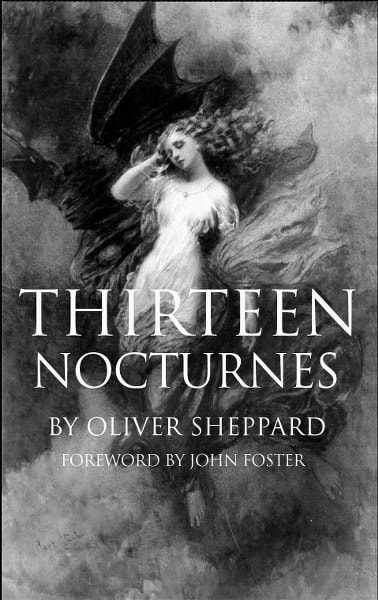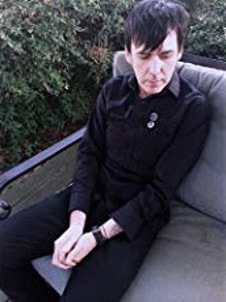Thirteen Nocturnes
by Oliver Sheppard
Genre: Gothic, Dark Poetry
Combining lush Gothic lyricism with postmodern experimentation, Oliver Sheppard’s second collection of verse, Thirteen Nocturnes, presents a nightmare vision of a world in the grip of apocalypse and shadow–a world where “a nighttime of years never-ending” becomes “a darkness severe and unbending,” and where life is relentlessly “gathered up against the towering shadow of decay.” Taking cues from the dark Romanticism of Poe, the decadent Symbolism of Baudelaire, and the apocalyptic tradition of William Blake–as well as the existential doominess of 20th century cosmic horror–Oliver Sheppard’s Thirteen Nocturnes presents a verse vision of collapse, announcing a cold poetics of disintegration in the new dark age of the Anthropocene.
“Reading Sheppard’s poetry is a little like listening to a conversation between Nietzsche and William Blake during a showing of Peckinpah’s Cross of Iron. Using a wide range of forms and cultural references, Sheppard illustrates the human condition in ways that take as much account of its absence as its presence… Given the chance, Sheppard will lead you down dark and unfamiliar paths, to moments of weird beauty.” –from the foreword by John Foster
NIGHT, MELANCHOLY, AND THIRTEEN NOCTURNES by Oliver Sheppard One of Edgar Allan Poe's most poignant poems is the brief (and probably unfinished) couplet that is usually reprinted under the title "Deep in Earth." It reads: Deep in Earth my love is lying And I must weep alone. --And that, elegantly, is the poem's entirety. Poe wrote "Deep in Earth" in 1847 while mourning the death of his young wife, Virginia Clemm. He scribbled the couplet in the margins of a manuscript for "Eulalie," which may have been one of Virginia's favorites of her newly widowed husband's works. Poe always insisted that poets should write with an eye to what he called "unity of effect"-- that is, that every poetic effort ought ultimately to leave a distinct and singular impression--a uniquely powerful effect--on the reader. Toward this end Poe felt that, despite what classicists might say, or despite what readers might think, longer poems were not necessarily more accomplished, more literary, or the most successful in their designs. Bigger was not always better. "Unity of effect" was usually achieved with fewer lines, with lines honed and sharpened to cut right to the reader's jugular. But the emotional gut-punch of Poe's "Deep in Earth" might have less to do with the application of any high-minded literary theories than with the raw emotion that is evident behind its words. Yet the stark lines are a validation of Poe's "unity of effect" ideal nonetheless. Before I get to one of my own attempts at achieving such an effect in my new collection of verse, Thirteen Nocturnes, I'd like to offer another poem that I think achieves a forceful effect similar to that of Poe's "Deep in Earth" above. This poem is by Sara Teasdale, from 1915: I SHALL NOT CARE by Sara Teasdale When I am dead and over me bright April Shakes out her rain-drenched hair, Tho' you should lean above me broken-hearted, I shall not care. I shall have peace, as leafy trees are peaceful When rain bends down the bough, And I shall be more silent and cold-hearted Than you are now. Eighteen years after this poem was published Sara Teasdale took an overdose of sleeping pills and ended her own life. An urban legend persists that Teasdale wrote "I Shall Not Care" as her suicide note. Teasdale and Poe had issues with chronic major depression, something I and a great many other poets have also struggled with. There are a variety of influences that went into the composition of my book, Thirteen Nocturnes, and I hesitate even now to say that my struggles with depression have been an "influence" in the same way that, say, the poetry of Baudelaire or Giacomo Leopardi have been influences on me. But my own bouts of depression have added much of the color to my verse, or have provided the impetus for it, and have informed its tone, in some individual poems more than others. The original idea behind Thirteen Nocturnes was to write a slim chapbook of thirteen poems that were either meditations upon, or were odes to, or had in some way been inspired by, the night. The project snowballed and I confined the original thirteen poems to one section of a five section collection of poetry, but I decided to keep "Thirteen Nocturnes" as the title for the overall work. Aiming for a kind of unity of effect described above, I took pen to paper and in one of the thirteen nocturnes I tried to describe my decades-long battle with the sort of depression that William Styron in Darkness Visible called "a storm indeed, but a storm of murk": NOCTURNE No. 2 by Oliver Sheppard Night was my vigil; I sat it alone, A nighttime of years never-ending, Years by myself where light was unknown, The darkness severe and unbending. I came upon means in my decades-long fight To only but briefly relieve it, And in certain moments I thought I'd found light But I was a fool to believe it.
Oliver Sheppard was born in Nashville, Tennessee, and lives in Texas. Critical reviews of his poetry collections have been kind: “Like listening to a conversation between Nietzsche and William Blake while watching Peckinpah’s ‘Cross of Iron’,” reviews of his first book, Destruction: Text I, claimed. Garnering accolades from academia and punk zines alike, Sheppard’s work takes cues from the cosmic fatalism of Lovecraft and Thomas Ligotti, and combines that with the lush, Gothic lyricism of the Dark Romanticist tradition.
“Sheppard’s THIRTEEN NOCTURNES is gothic in every sense of the word; from the writing style, the themes, to Oliver’s own influences. Without a doubt, this bountiful collection raises the bar for contemporary gothic poetry. It’s rare in this day and age to find poetry written in a manner as sophisticated and profound as this. But here, Sheppard combines a down-to-earth modernism with older styles that make for a fanciful and unique experience for the reader.”–Sar Blackthorn, CVLT Nation





